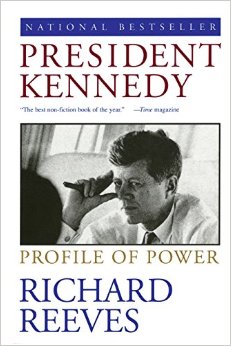With the crack of rifle fire on Nov. 22, 1963, Lee Harvey Oswald brutally cut short President John F. Kennedy's first term in office - the "Thousand Days" that has since grown to mythic proportions and spawned a series of either fawning or viciously distorted histories.
The Kennedy presidency is examined in minute detail and refreshing objectivity by syndicated columnist Richard Reeves in his new study, "President Kennedy: Profile of Power" (Simon & Schuster, $30). Reeves strives to reconstruct the day-to-day view from inside the Kennedy Oval Office at the height of the Cold War.
Kennedy, it becomes clear, was constantly weighing his every step with an eye toward the Soviets. He was aware that many viewed him as indecisive and weak and that he had been elected by a very narrow margin of 118,574 votes - a number he kept on a piece of paper in his pocket.
Kennedy's domestic agenda languished, despite Democratic majorities in both houses of Congress, and Republicans and conservative Southern Democrats were not anxious to enact his plans for health care for the elderly, free trade for Europe and aid to education. Sounds eerily familiar.
In addition, Kennedy's leadership style emerges as chaotic and disorganized. Envisioned at first as a break with the Eisenhower bureaucracy, Kennedy was quickly buried in paper and minutiae, and like many new presidents, he was unprepared for the job's demands.
The trouble in Cuba
One surprise was the disastrous invasion of Cuba at the Bay of Pigs. A tiny Cuban brigade, trained and financed by the American military, was pinned down on the beach, its survival or escape in question without full-scale American intervention.
Only later did Kennedy realize that his generals had envisioned precisely that all along. He vowed not to repeat the experience, subsequently withdrawing our military from further engagement in Laos. Reeves believes the two humiliations set the stage for the increasing American commitment to Vietnam and for Kennedy's bold confrontation with the Soviets over the Cuban missiles: "There are limits to the number of defeats I can defend in one 12-month period," Kennedy told confidants.
Reeves devotes an extended portion of the book to the Cuban Missile Crisis, and the account recalls how close the nation came to a nuclear exchange with the Soviets. Kennedy's strategy ultimately defused the crisis, but only on the Sunday morning before a planned military invasion on Tuesday. Like many Americans, JFK drew his family close during the confrontation, recognizing the potential disaster lurking.
Smaller confrontations
Reeves also portrays a seriously ill man, heavily medicated by a number of sometimes feuding doctors, and almost incapacitated at times by his back pains, but still struggling Richard Reeves with the decisions and emergencies demanding his attention. He also recalls less momentous situations.
In early 1962, FBI Director J. Edgar Hoover wanted to know why the president was not taking action against an ambassador in Europe who was caught, literally, with his pants down, jumping from the window of a lady's bedroom. Kennedy smoothly replied that he would make an effort to hire ambassadors who could run faster.
Kennedy's possibly most revealing comment was made to Washington Star reporter Mary McGrory, who had written about Republican presidential hopeful Barry Goldwater. Kennedy told McGrory that he had noticed the article, but had not read it: "I don't read things about politicians who say they would rather be right than be president."
Ultimately, that comment defines the Kennedy presidency for Reeves: an intensely pragmatic politician willing to defer his ideals to the political reality of the moment.
Reeves' writing is fluid and captivating, but he could have used a more careful editor. Several quotations are repeated, and Reeves' thoughtful analysis drops off as the book progresses. Still, these flaws are minor. The book is spectacularly successful in providing a ground-level view of the White House in operation. One can see Kennedy in action, flaws and all, and better understand the awesome responsibilities of the job.
Assassination revisited
Gerald Posner's "Case Closed: Lee Harvey Oswald and the Assassination of JFK" (Random House, $25) picks up where Reeves leaves off. The book is a detailed study of the assassination, including dozens of new interviews, discussions of recent computer-enhanced analyses and almost 200 pages on Oswald before the assassination.
Posner reveals that Oswald earlier unsuccessfully attempted to assassinate retired U.S. Gen. Edwin Walker, a right-wing activist relieved of his duties by President Kennedy in 1961. Posner also details Oswald's defection to the Soviet Union, the skeptical reaction to him there, and his disillusioned return.
Posner takes on all the major conspiracy theorists, with particular disdain for Oliver Stone's recent movie, "JFK." He advances a compelling case that Oswald acted alone and that the Warren Commission reached the correct result, albeit through flawed investigative work.
Quoting historian William Manchester, Posner acknowledges that for many the assassination is difficult to comprehend, with the murdered president on one side and "that wretched waif Oswald" on the other.
"You want to add something weightier to Oswald" to invest the murder with meaning, making JFK a martyr, Manchester has written. "A conspiracy would, of course, do the job nicely. Unfortunately, there is no evidence whatever that there was one."
Agreeing with Manchester, Posner concludes: "To say otherwise is to absolve a man with blood on his hands, and to mock the president he killed.
